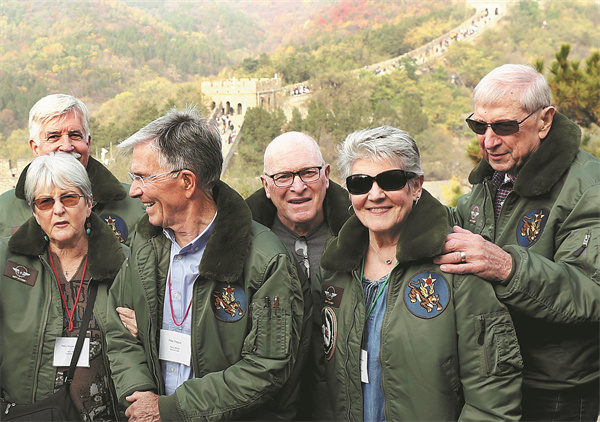

When Clifford Long Junior, 70, son of Clifford Long Senior, a member of the "Flying Tigers" — the US World War II air force veterans helped the Chinese people in their War of Resistance Against Japanese Aggression (1931-45) — visited the Liuzhou Military Museum in Liuzhou, Guangxi Zhuang autonomous region, in November, his eyes welled up on seeing the wartime archive of photographs, weapons, remnants and artifacts that were on display.
Later, facing media cameras, he shared some rare pictures from his family album. The images featured wartime moments of his father. One image showed the senior Clifford sitting in a fighter plane alone. In other images, the dad could be seen with his air force crew members.
"My father was here (in China) in 1944. He was 19 years old, when he flew ground support very close to Chinese soldiers. The latter recognized him in the cockpit and nicknamed him 'Lieutenant Moonface' (as they thought his face was round)," he said, voice tinged with pride.
The son shared another picture wherein his father is seen standing alongside a grounded fighter jet. "This is a picture of him after crash landing. He survived, else I'd not be here," he said with a laugh.
Clifford Long Junior lives in the United States, and has been deeply involved for many years now with the Sino-American Aviation Heritage Foundation, a prominent NGO that promotes the legacy of Flying Tigers. The NGO is led by its chairman, Jeffrey Greene.
From late October to early November, Long was in China as a member of a delegation of the foundation that was invited for a 10-day visit. The foundation is seeking to advance goodwill and friendship with the Chinese people.
The delegation of more than 30 included two living legends — Flying Tiger veterans Harry Moyer and Mel McMullen — and first-, second-and even third-generation descendants of the Flying Tigers.
The trip took them to historical sites and tourist attractions beyond Liuzhou — places like Beijing, Chongqing and Kunming, the capital of Yunnan province.
Long said that before visiting China, he spoke with as many people as possible in the US about the Flying Tigers' relationship with the Chinese people. He wanted to gather as much information as possible so he could share it with others.
"In our country, although a lot of people are familiar with the term 'Flying Tigers', they only associate it with the P40 planes with tiger's teeth (patterns) on them, and they don't really understand or (are) not taught history," he said.
"I try to talk about that (part of) history with as many people as I can and shall continue to do so once I am back in our country, to promote the Chinese-American relations. That's what I do. I work with Jeff (Jeffrey Greene) and help him out with whatever I can, to promote our bilateral relations."
Speaking on the core spirit of Flying Tigers, Long said love, life and circumstances characterized the young veterans back in World War II, which is now part of history.
His parents, he recalled, fell in love while at school. His father later joined the US Army Air Corps and came to China. After a long and eventful life, his father passed on in 2019 aged 94. Three months later, his mother passed on.
Long said when his dad was in China, his parents "wrote to each other every day, and he put his and her names on his plane".
"In 1944, there was no international communication, there was no internet ... You couldn't even talk on telephone from continent to continent," he said.
Back then, Long Senior was just a young man from a small town in the US and had never even been on a plane before he joined the air force.
"He was taught how to fly the plane, he came over to China to fly for General (Claire) Chennault, and during his time here, he fell in love with the Chinese people, and he was very proud that he was able to help them," Long said.